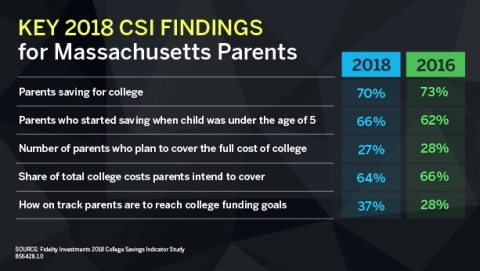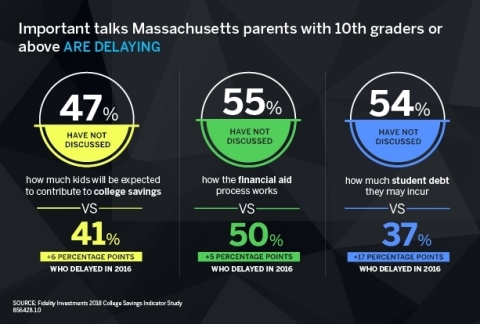BOSTON--(BUSINESS WIRE)--How are Massachusetts families coping with the increasing cost of college? Many parents—particularly those carrying their own student debt—are asking kids to share more of the responsibility for funding college. Findings from Fidelity Investments® and the Massachusetts Educational Financing Authority (MEFA)’s 2018 College Savings Indicator Study also reveal that although many parents are saving earlier, it’s still not enough: More parents are starting to save before their child reaches the age of five—66 percent, up from 62 percent in 2016—but are on track to meet just 37 percent of their college funding goals. The good news: this important college savings indicator is higher than the national average of 28 percent and is also up nine percentage points from 2016, when Massachusetts parents were on track to meet 28 percent of their college funding goals. (See graphic on “Key 2018 CSI Study Findings for Massachusetts Parents.”)
“Compared to rest of the nation, Massachusetts parents have always shown a strong commitment to college savings, and these survey results show we have the opportunity to build on these numbers,” said Tom Graf, Executive Director of MEFA. “With the new college savings tax deduction and lower account fees for the U.Fund, we are creating more incentives to save and helping families achieve their educational goals."
Part of the improvement comes because parents expect their children to take on a significant share of college costs. Even though Massachusetts parents plan to cover the majority (66 percent) themselves, the study found parents want their children to set aside an average of $9,282 by high school graduation. In addition, fewer parents feel it’s their obligation to foot the whole bill for their children’s college costs (47 percent, which is significantly lower than 60 percent, the response when the study was first introduced in 2007. It’s also lower than the national average of 49 percent).
Considering these enhanced expectations, it’s surprising that a number of parents are delaying critical conversations with their children about chipping in for college. In fact, almost half (47 percent) of parents with sophomores or older haven’t discussed the fact that kids will be expected to contribute to college savings, up from 41 percent in 2016.
“The study’s findings are a sobering wake-up call for parents to improve communications with college-bound kids,” said Melissa Ridolfi, vice president of Retirement and College Products at Fidelity. “While parents need to be realistic when it comes to how much they can contribute to their kids’ education and expecting children to assume more responsibility for college costs makes sense, the right time for the college talk is long before the first tuition bill is due.”
How much kids will be expected to pitch in isn’t the only topic many parents of 10th graders or older are putting off. (For a look at other delayed conversations, see graphic on “Important talks Massachusetts parents with 10th graders or above are delaying.”)
Parents Need to Build Greater Awareness of 529 College Savings Plan
Benefits
Although the survey reveals that 83 percent of
Massachusetts parents feel they are better educated about their finances
having dealt with their own student loan debt, more can be done to
maximize saving for college. Fifty percent of parents admit they don’t
know the best accounts for college savings and more than half (51
percent) express uncertainty regarding exactly how much to save each
month. One possible factor: only 52 percent say they have a financial
plan in place to reach college savings goals, a decline from 2016, when
57 percent of parents had a plan in place.
One area where Massachusetts parents may want to consider building greater awareness involves the use of dedicated college savings accounts, particularly 529 plans. Although 71 percent of respondents indicate they are familiar with 529 savings plans, only 39 percent have opened one, which is lower than 2016 (46 percent). Of significance, those who have started saving for college report setting aside an average of $32,200 into a 529, which is a sizeable increase from 2016, when the average was $20,400.
Furthermore, 66 percent of Massachusetts respondents indicate they aren’t sure whether the state offers a tax deduction credit for contributing to college—although 79 percent indicate they would be more likely to save more for college if a tax deduction for contributing to a 529 college savings plan was available. In fact, since 2017, the Commonwealth has offered an annual in-state tax deduction for those contributing to the U.Fund College Investing Plan, the Massachusetts 529 plan—and has actually seen a large increase in new account openings (57 percent) since the passage of the deduction.
Tips and Resources to Help Parents Save More for College
For
those looking for additional ways to defray college costs, parents in
the Commonwealth share this advice: save as early as possible for
college (50 percent); treat saving for college like paying a bill for
yourself (29 percent); open a dedicated savings account as soon as your
child is born (27 percent); and make automatic monthly deposits into a
dedicated college savings account (also at 27 percent).
Looking for more ways to boost your college savings? Fidelity and MEFA have additional resources available to help families:
- Viewpoints articles providing more insights on college topics, including: 5 lessons learned for college savings, Tips for raising a saver, How much college can you really afford? and a Student loan guide. Additionally, developed for a younger generation of parents who are constantly on-the-go, Fidelity.com/mymoney offers short, interactive financial resources.
- Fidelity’s online College Savings Quick Check calculator can show parents the impact of saving a few extra dollars each month, based on their own timeline.
- Fidelity’s College Savings Learning Center provides a library of online resources for parents, including video courses on saving account options and strategies, and resources on more ways to pay for college--such as how to apply for financial aid and scholarships.
- Asking friends and family to consider gifting to college savings for birthdays or other holidays is becoming more common. To make contributing easier, Fidelity offers a 529 Online Gifting Service, which lets owners of Fidelity’s retail 529 college savings accounts encourage friends and family to help them save for college.
- MEFA and Fidelity offer complimentary college saving and financing guidance provided by dedicated representatives who are available to answer questions regarding savings options, including how to open a U.Fund College Investing Plan account. Parents can take advantage of college planning guidance at Fidelity’s nine investor centers across Massachusetts, by calling 800-544-2776, or visiting fidelity.com/ufund.
- At mefa.org, MEFA provides free, expert guidance on planning, saving and paying for college, as well as links to career planning and financial aid resources. In addition, MEFA’s community outreach includes more than 500 webinars and seminars annually led by financial aid specialists across Massachusetts.
About the Fidelity Investments 2018 College Savings Indicator Study
As
part of the study, Fidelity conducted a survey of parents with
college-bound children of all ages. Parents provided data on their
current and projected household asset levels including college savings,
use of an investment advisor and general expectations and attitudes
toward financing their children’s college education. Using Fidelity’s
proprietary asset-liability modeling engine, the company was able to
calculate future college savings levels per household against
anticipated college costs. The results provided insight into the
financial challenges parents face in saving for college. Data for the
Indicator (number of children in household, time to matriculation,
school type, current savings and expected future contributions) was
collected by Boston Research Technologies, an independent research firm,
through an online survey from May 15 – June 15, 2018, of 1,899 families
nationwide with children aged 18 and younger who are expected to attend
college. The survey respondents had household incomes of at least
$30,000 a year or more, and were the financial decision makers in their
household. College costs were sourced from the College Board’s Trends in
College Pricing 2017. Future assets per household were computed by
Fidelity Personal and Workplace Advisors LLC (FPWA), a registered
investment adviser and a Fidelity Investments company. Within Fidelity’s
asset-liability model, Monte Carlo simulations were used to estimate
future assets at a 75 percent confidence level. The results of the
Fidelity College Savings Indicator may not be representative of all
parents and students meeting the same criteria as those surveyed for
this study. For more information, an Executive
Summary of the Massachusetts findings can be found on Fidelity.com.
About Fidelity Investments
Fidelity’s mission is to inspire
better futures and deliver better outcomes for the customers and
businesses we serve. With assets under administration of $7.2 trillion,
including managed assets of $2.6 trillion as of July 31, 2018, we focus
on meeting the unique needs of a diverse set of customers: helping more
than 27 million people invest their own life savings, 23,000 businesses
manage employee benefit programs, as well as providing more than 12,500
financial advisory firms with investment and technology solutions to
invest their own clients’ money. Privately held for 70 years, Fidelity
employs more than 40,000 associates who are focused on the long-term
success of our customers. For more information about Fidelity
Investments, visit https://www.fidelity.com/about.
About The Massachusetts Educational Financing Authority (MEFA)
MEFA
is a not-for-profit state authority, not reliant on state or federal
appropriations, established under Massachusetts General Laws, Chapter
15C. MEFA’s mission, since its founding in 1982, has been to help
Massachusetts students and families access and afford higher education
and reach financial goals through education programs, tax-advantaged
savings plans, low-cost loans, and expert guidance. Recently, MEFA’s
mission has been enriched through its statutory designation to establish
and administer the ABLE Savings Plan, created to help individuals with
disabilities save for disability-related expenses. The Attainable
Savings Plan is a program of MEFA and administered by Fidelity
Investments. For more information, visit mefa.org
to learn more or follow MEFA on Twitter @mefatweets and on Facebook at
mefaMA.
Please carefully consider the plan's investment objectives, risks, charges, and expenses before investing. For this and other information on any 529 college savings plan managed by Fidelity, contact Fidelity for a free Fact Kit, or view one online. Read it carefully before you invest or send money.
The U.Fund College Investing Plan is offered by MEFA and managed by Fidelity Investments. If you or the designated beneficiary is not a Massachusetts resident, you may want to consider, before investing, whether your state or the designated beneficiary's home state offers its residents a plan with alternate state tax advantages or other benefits such as financial aid, scholarship funds and protection from creditors.
Units of the portfolios are municipal securities and may be subject to market volatility and fluctuation.
Fidelity, Fidelity Investments, Fidelity Advisor Funds, and the Fidelity Investments & Pyramid Design logo are registered service marks of FMR LLC.
The third party marks appearing herein are the property of their respective owners.
Boston Research Technologies is not affiliated with Fidelity Investments.
MEFA, MEFA U.FUND MASSACHUSETTS 529 PLAN and U. FUND are registered service marks of the Massachusetts Educational Financing Authority.
856428.1.0
© 2018 FMR LLC.





